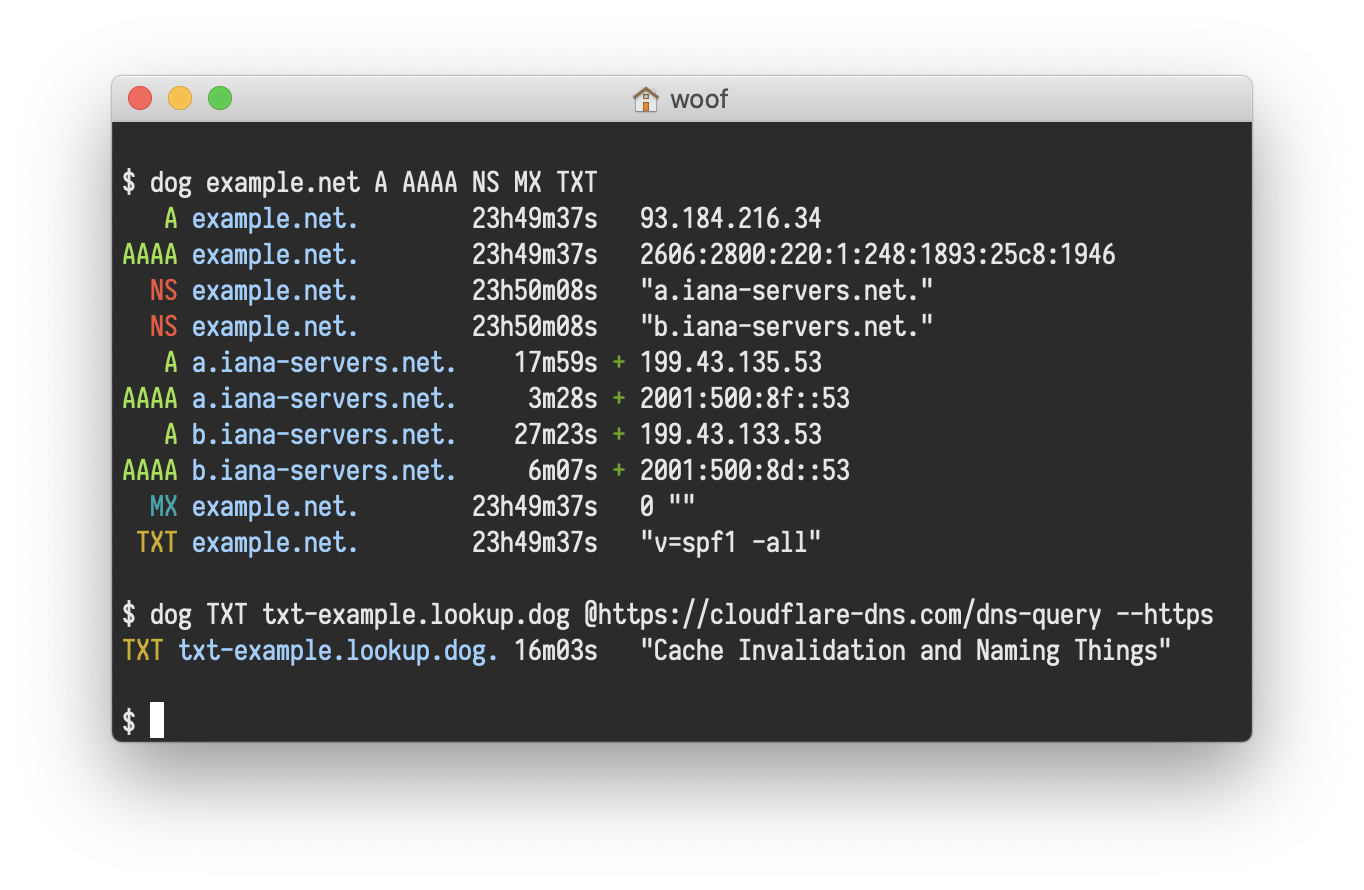|
|
5 years ago | |
|---|---|---|
| .github | 5 years ago | |
| dns | 5 years ago | |
| dns-transport | 5 years ago | |
| man | 5 years ago | |
| src | 5 years ago | |
| xtests | 5 years ago | |
| .gitignore | 5 years ago | |
| .rustfmt.toml | 5 years ago | |
| .travis.yml | 5 years ago | |
| Cargo.lock | 5 years ago | |
| Cargo.toml | 5 years ago | |
| Justfile | 5 years ago | |
| LICENCE | 5 years ago | |
| README.md | 5 years ago | |
| build.rs | 5 years ago | |
| dog-screenshot.png | 5 years ago |
README.md
Dogs can look up!
dog is a command-line DNS client, like dig.
It has colourful output, understands normal command-line argument syntax, supports the DNS-over-TLS and DNS-over-HTTPS protocols, and can emit JSON.
Examples
dog example.net Query a domain using default settings
dog example.net MX ...looking up MX records instead
dog example.net MX @1.1.1.1 ...using a specific nameserver instead
dog example.net MX @1.1.1.1 -T ...using TCP rather than UDP
dog -q example.net -t MX -n 1.1.1.1 -T As above, but using explicit arguments
Command-line options
Query options
<arguments> Human-readable host names, nameservers, types, or classes
-q, --query=HOST Host name or IP address to query
-t, --type=TYPE Type of the DNS record being queried (A, MX, NS...)
-n, --nameserver=ADDR Address of the nameserver to send packets to
--class=CLASS Network class of the DNS record being queried (IN, CH, HS)
Sending options
--edns=SETTING Whether to OPT in to EDNS (disable, hide, show)
--txid=NUMBER Set the transaction ID to a specific value
-Z=TWEAKS Uncommon protocol tweaks
Protocol options
-U, --udp Use the DNS protocol over UDP
-T, --tcp Use the DNS protocol over TCP
-S, --tls Use the DNS-over-TLS protocol
-H, --https Use the DNS-over-HTTPS protocol
Output options
-1, --short Short mode: display nothing but the first result
-J, --json Display the output as JSON
--color, --colour=WHEN When to colourise the output (always, automatic, never)
--seconds Do not format durations, display them as seconds
--time Print how long the response took to arrive
Installation
Installing dog requires building it from source.
Compilation
dog is written in Rust. You will need rustc version 1.45.0 or higher. The recommended way to install Rust for development is from the official download page, using rustup.
To build, download the source code and run:
$ cargo build
$ cargo test
The just command runner can be used to run some helpful development commands, in a manner similar to
make. Runjust --tasksto get an overview of what’s available.If you are compiling a copy for yourself, be sure to run
cargo build --releaseorjust build-releaseto benefit from release-mode optimisations. Copy the resulting binary, which will be in thetarget/releasedirectory, into a folder in your$PATH./usr/local/binis usually a good choice.To compile and install the manual pages, you will need pandoc. The
just mancommand will compile the Markdown into manual pages, which it will place in thetarget/mandirectory. To use them, copy them into a directory thatmanwill read./usr/local/share/manis usually a good choice.
Testing
dog has an integration test suite written as Specsheet check documents. If you have a copy installed, you can run:
just xtests
Specsheet will test the compiled binary by making DNS requests over the network, checking that dog returns results and does not crash.
Documentation
For documentation on how to use dog, see the website: https://dns.lookup.dog/
See also
mutt, tail, sleep, roff
Licence
dog’s source code is under the MIT Licence.

